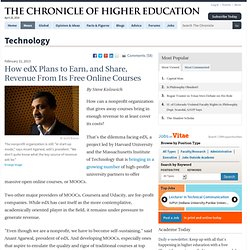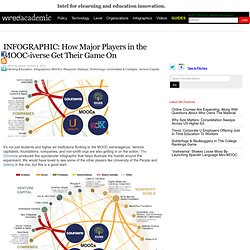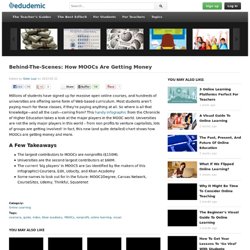

How EdX Plans to Earn, and Share, Revenue From Free Online Courses - Technology. By Steve Kolowich How can a nonprofit organization that gives away courses bring in enough revenue to at least cover its costs?

That's the dilemma facing edX, a project led by Harvard University and the Massachusetts Institute of Technology that is bringing in a growing number of high-profile university partners to offer massive open online courses, or MOOCs. Two other major providers of MOOCs, Coursera and Udacity, are for-profit companies. While edX has cast itself as the more contemplative, academically oriented player in the field, it remains under pressure to generate revenue. "Even though we are a nonprofit, we have to become self-sustaining," said Anant Agarwal, president of edX.
Legal documents, obtained by The Chronicle from edX, shed some light on how edX plans to make money and compensate its university partners. According to Mr. Although the edX-supported model requires cash upfront, the potential returns for the university are high if a course ends up making money. Coursera Announces Details for Selling Certificates and Verifying Identities - Wired Campus. How is a major provider of free online courses going to tell whether you are who you say you are?

By how you type. The company, Coursera, plans to announce on Wednesday the start of a pilot project to check the identities of its students and offer “verified certificates” of completion, for a fee. A key part of that validation process will involve what Coursera officials call “keystroke biometrics”—analyzing each user’s pattern and rhythm of typing to serve as a kind of fingerprint. The company has long said that it planned to bring in revenue by charging a fee to students who complete courses and want to prove that achievement. And Coursera has long recognized that its biggest challenge would be setting up a system to check identity. What You Need to Know About MOOCs: A guide to The Chronicle’s coverage of massive open online courses. Coursera has decided to try to check IDs remotely, so that students can take tests from anywhere. The company’s verification system involves several steps: MOOCs are Marketing. Earlier this week, Georgia Tech and eleven other higher education institutions announced their participation in Coursera, a company that hosts online courses.
Reactions have been predictably dramatic, as exemplified by Jordan Weissman's panegyric in the Atlantic, titled The Single Most Important Experiment in Higher Education. I'll spare observations on the obvious problems with Weissman's article, like the witless claim that lectures as web video somehow "reinvent" the lecture. Or the fact that Weissman published an article two weeks ago titled Why the Internet Isn't Going to End College As We Know It. Take this excerpt instead: The fundamental challenge for U.S. universities as they struggle to contain their costs is figuring out how to teach more students using fewer resources. This is the biggest and most insidious misconception, the one that pervades every conversation about online education. Here's one: Coursera is marketing. INFOGRAPHIC: How Major Players in the MOOC-iverse Get Their Game On. It’s not just students and higher ed institutions flocking to the MOOC extravaganza.

Venture capitalists, foundations, companies, and non-profit orgs are also getting in on the action. Major Players in the MOOC Universe - The Digital Campus 2013. Behind-The-Scenes: How MOOCs Are Getting Money. Millions of students have signed up for massive open online courses, and hundreds of universities are offering some form of Web-based curriculum.

Most students aren’t paying much for these classes, if they’re paying anything at all. So where is all that knowledge—and all the cash—coming from? This handy infographic from the Chronicle of Higher Education takes a look at the major players in the MOOC world. Universities are not the only major players in this world – from non profits to venture capitalists, lots of groups are getting involved! In fact, this new (and quite detailed) chart shows how MOOCs are getting money and more.
Coursera, Chegg, and the Education Enclosure Movement. The online learning startup Coursera and a handful of textbook publishers announced today that they’re teaming up to make certain digital course materials available to students enrolled in Coursera’s classes.

Cengage Learning, Macmillan Higher Education, Oxford University Press, SAGE, and Wiley will offer versions of their textbooks via an e-reader provided by Chegg. For certain courses, students will be able to access all or parts of textbooks for free. The materials are restricted by DRM: students will not be able to copy-paste or print, and access to the textbooks will be revoked when the course ends. As the press release reads, of course, “students will also be able to purchase full versions of e-textbooks provided by publishers for continued personal learning.” The partnership aims to encourage professors to assign more reading in their Coursera courses.
But I think it signals other things too about the rapidly changing MOOC landscape… Super-professors. But not Coursera.